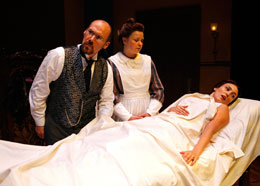Titillation of the title notwithstanding, In the Next Room or the Vibrator Play, written by Sarah Ruhl, directed by Casey Stangl for South Coast Repertory, recounts the timeless story of a underappreciated wife who wants her husband, who invented a beta version of the Pocket Rocket to cure hysteria, to pay her some real attention. With great and seemingly impossible understatement, Stangl gets us to think of this prototypical vibrator, a large contraption that resembles an old-fashioned radio, as an elephant in the room: the effects of said device make us laugh at the characters' reactions but the cause that occasioned its invention -- Victorian inhibition -- makes us empathize with them.
What makes the production so effective, so outrageous, can be seen in the contrast between the two rooms to which the title alludes. The living room for receiving guests is prosperous and proper, if not repressed; the examination room, not as elaborate or formal as the living room, is where the stimulation occurs. The distinction is reinforced by the period's physically prim relations between men and women: undressing is a private act and yet the doctor sticking an electrical device between the legs of a female patient is not because it's done in the name of science.
Granted, the premise allows for some outrageous sessions. The audience was kept in stitches by the application of wand to patient. Be it Sabrina Daldry (Rebecca Mozo), wife of Mr. Daldry (Tom Shelton), or else, variously, the doctor's wife Catherine (Kathleen Early), his assistant Annie (Libby West), or even, with a slight modification, Leo Irving (Ron Menzel), a gregarious artist, the barely articulated grunts, gasps, and moans of these otherwise prim Victorians' to the machine's ministrations was like watching late 19th century porn.
But the heart of the play was about dealing with loss and privation. Mrs. Daldry's initial dark and bleak state suggested that something was terribly wrong. Catherine's despair when Elizabeth (Tracey A. Leigh), the Daldry's maid who had just lost her infant child, was hired breast freed her newborn child, was real and moving. So were her initial, futile attempts to get her husband to attend to her needs.
Stangl let the actors underplay their role, the better to set off their sudden and unexpected reactions to the magic wand. This strategy works to great effect, especially in the portrayal of Leigh's despondent Catherine: we read her despondency more in her posture and downcast eyes than her soft voice. Same too with Mozo's Sabrina whose dark cloud (mourning clothes, black veil, catatonic manner) lifted the moment the good doctor worked his magic. The only character that really cut loose was Menzel's delightful bohemian artist Leo; the treatment had the opposite effect: it made him speechless.
Especially good was Borba's Doctor Givings. There was no distinction between his professional and his personal manner. He was all business, outrageously and sincerely asking his patients What do you feel? while they squirmed with paroxysms of ecstasy. But once he finally bared himself to his wife, he not only got to the heart of her needs, he got to the heart of his own, as well.
Performances are 7:45 p.m., Tuesday through Sunday, 2 p.m. Saturday & Sunday. Tickets are $20-$66. The play runs through October 17. The theatre is located at 655 Town Center Drive, Costa Mesa. For more information call (714) 708-5555 or visit www.scr.org.

